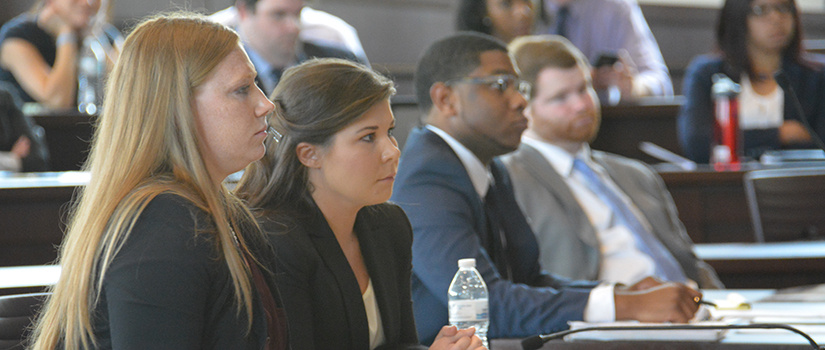The University of South Carolina School of Law congratulates third-year law students
Creasie Parrott and second-year student Kyle Watson for winning the ninth annual Judge J. Lyles Glenn Jr. and Terrell L. Glenn Sr. Mock Trial Competition on Sept. 22. The team was presented with the D. Reece Williams III Award, given by the American Board of Trial Advocates.
The case, The State of South Carolina v. Sydney Carter, involved an allegation of murder. Parrott and Watson argued the defense of Carter
against competitors second-year students Megan Rudd and Olivia Hassler. The final round of the competition was presided over by the Honorable Joseph F. Anderson Jr., a Senior U.S. District Judge for the District of South Carolina.
Rudd won the Robert McCormick Figg Jr. Trial Advocacy Award, presented to the top individual advocate in the competition by the South Carolina
Fellows of the American College of Trial Lawyers.
“It was an absolute honor to win this award as a 2L. I prepared tirelessly for this
competition and winning this award exceeded the expectations that I set for myself.
It made me proud of the work that I had done to prepare for this competition and it
motivated me to continue polishing my skills,” says Rudd.
The competition provides second- and third-year law students the opportunity to learn
and practice courtroom skills in a competitive setting. Competitions like this one
are why Parrott says she joined Mock Trial.
“Mock Trial offers a type of education that you simply cannot get anywhere else in
law school. It immerses you in trial strategy, evidence, and public speaking for two
years, which are skills that are incredibly difficult to learn while sitting in a
classroom,” says Parrott.
The South Carolina Law Mock Trial Team tied for 13th in the country in Fordham Law’s annual “Trial Competition Performance
Ranking,” a list based on competitions from the prior year.
The final round of the competition was also the first time students were able to
present a case in the school’s new Judge Karen J. Williams Courtroom.
“It’s an incredibly expansive and beautiful courtroom, so it was a wonderful experience
to argue the case there. Throughout the competition, we were also afforded the opportunity
to argue in the Judge Ross Anderson Historic Courtroom, which was a humbling experience,
as so many wonderful litigators over the years have argued before that bench,” says
Parrott.
Awards were chosen by a panel of scoring judges including Matt Abee of Nelson Mullins Riley & Scarborough, Debbie Barbier of the Law Office of Deborah B. Barbier, Greg Collins of McAngus, Goudelock & Courie, Prof. Elizabeth Dalzell and Prof. Kenneth Gaines, both of the School of Law.
The competition is named for Judge J. Lyles Glenn Jr. and his son Terrell L. Glenn Sr., two prominent lawyers from Chester, South Carolina. Judge Glenn was a national and
international figure who served as a federal judge. He also served as a member of
the South Carolina House of Representatives, a solicitor of the Sixth Judicial Circuit,
and was appointed as a United States District Judge, a position he held until his
passing. Glenn Sr. graduated from the School of Law in 1953 and worked as a United
States Army Judge Advocate General after graduation. He was appointed the youngest
U.S. District Attorney in 1961. His influence stretched across the country as president
of the South Carolina Bar, the Richland County Bar Association, as well as an active
member of the American Bar Association; however, he remained involved with his alma
mater, returning to teach trial advocacy at the School of Law.
